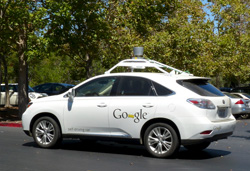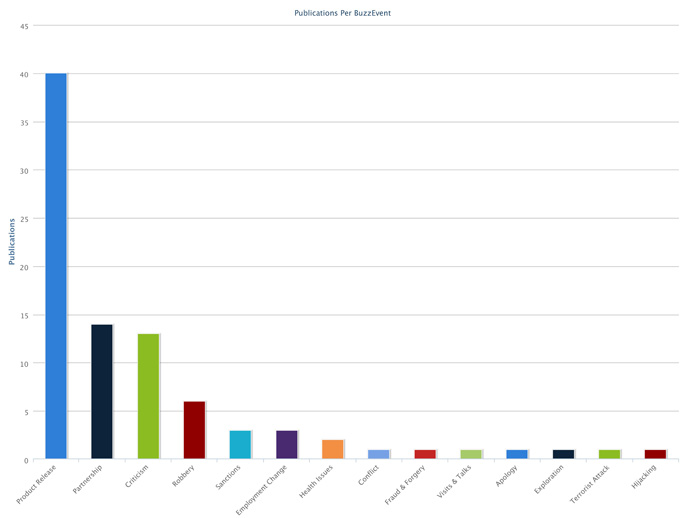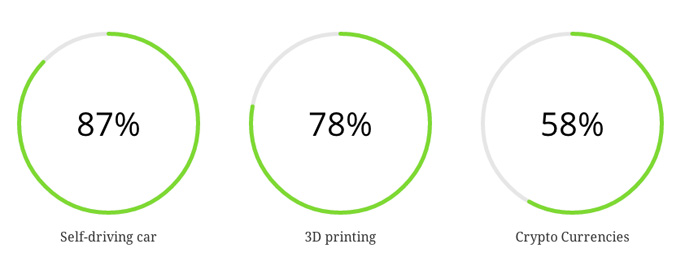
People are remembered for the predictions that are spot-on, while the ubiquitous predictions that are completely off are usually forgotten. Steven Lewitt and Stephen Dubnet, the writers of Freakonomics, argue in their latest book How to think like a freak that it’s probably best to make a lot of predictions. The risk of making a mistake is low, as almost no one has a strong incentive to keep track of everyone else’s bad prediction, while the rewards of being right are huge.
Science-fiction writer Isaac Asimov predicted exactly 50 years ago that in 2014 self-driving “roboticized” vehicles would be up-and-coming. And though some predictions were wrong, in nature or time, his views about autonomous cars was spot-on.
Driver-free cars are indeed on the rise but are we ready for them? The potential benefits seem obvious, but the same is true for the down sides.
Discovering the good, the bad and the ugly of self-driving cars
We have set-up a Buzz Report to find out more about what people are saying and feeling about these cars. We have selected the past 36 weeks and included only online publications (news, blogs and journals) in the English language. For Twitter we selected only the most recent days to get the feel of the moment. Using BuzzTalk as a discovery engine we quickly find relevant publications in various sources. We had the tagging engine categorize these publications so we can drill down by subtopic.
The pros: Why we need driverless cars
“Despite all the time humans spend in classrooms, and the small fortune we pay in college fees to learn how to think logically, we still make an awful lot of mistakes. To be precise about 5.1 million mistakes in the US alone. Unfortunately there are over 5.5 million car crashes in the US , with 93% of these crashes having humans error as the primary factor.” says Chuck Tesla on Tumotech.

Self-driving cars eliminate driver-related errors and help people with disabilities live more independent lives. Or to quote the New Yorker on Google’s driverless car: “Every year we delay this, more people die”.
Other advantages we find are:
- Increased mobility for seniors and people with disabilities.
- You don’t need a driver’s license.
- Opportunities for “parental controls” on the car.
- Multi-tasking in the car is no longer necessary.
- (In theory) it’s ok to drink and ‘drive’.
- You can’t get lost.
- Car sharing is enabled (a car just picks you up when you need one), so fewer cars are required which means less pollution.
This new technology raises questions, some hypothetical some hilarious. The New York Times hypothetically asks: “Suppose O.J. Simpson was heading down the freeway in a Google car? Could Google have stopped it?”.
The cons: Current objections to self-driving cars
In your mind you may already be imagining dozing off in your car to awake refreshed at your destination, or perhaps you’re thinking about finishing that book while your car is autonomously driving you to your next appointment. Being able to relax would be a great pro, but other people are worrying about giving up control and relying on technology.
— L.A.W. (@LAWtheband) June 20, 2014
So when presented with the actual question if one would step into a driver-fee car a lot of people step back. The mind jumps in. Questions and objections arise. Hypothetical technology is fun, but real technology creeps us out. Concerns exist in the field of law and safety. It’s still software and software can have bugs, malfunction or simply crash. Even without human error, accidents will happen.
Within BuzzTalk it’s easy to immediately jump to the draw backs. Publications that express criticism in the title are categorized in this specific BuzzEvent.

By clicking on the event type ‘criticism’ we discover discussions on blogs and twitter about this one big question:
“When a driverless vehicle runs a red light or crashes, who’s to blame and receives a ticket?”
Other questions and worries:
- Should the cars be required to have markings indicating their autonomous capabilities?
- Should a separate driver’s license be required?
- How will insurance work?
- Will traditional cars be banned and our licenses taken away?
- “Suppose Thelma and Louise were on the run in the Google car. Louise is not behind the wheel. There is no wheel. No Thunderbird. No top down. Imagine James Bond in a Google car. No, don’t imagine any of this, it’s too depressing.”
The overall sentiment surrounding autonomous cars
This technology will be introduced gradually, so we all have time to think this through. As Bret Kenwell says: “Fully autonomous vehicles – as in, a car that you hop in, plug in your destination, and read a book until you arrive – aren’t coming any time soon. But over the years, automakers and autonomous vehicle developers will continue to add more and more “subtle” solutions to our everyday driving challenges, (such as automatic braking, self-adjusting cruise control, and self-parking capabilities).”
Overall we’re quite positive about these automobiles. The following graph depicts the positive sentiment for three new technologies. 3D printing is very promising as well, but the self-driving car tops this. The crypto currencies are promising as well but sentiment looks to have been (temporarily) damaged by Mt.Gox’s issues.

By monitoring what people are expressing online we can assess the sentiment, objections and overall readiness which are ingredients for further technology development, legal discussions and formulation of the value proposition. In whatever direction this is going, it’s certainly is going to be a quite ride!
Photo credit: Google self-driving car by Roman Boed / Flickr / CC BY 2.0


Recent Comments